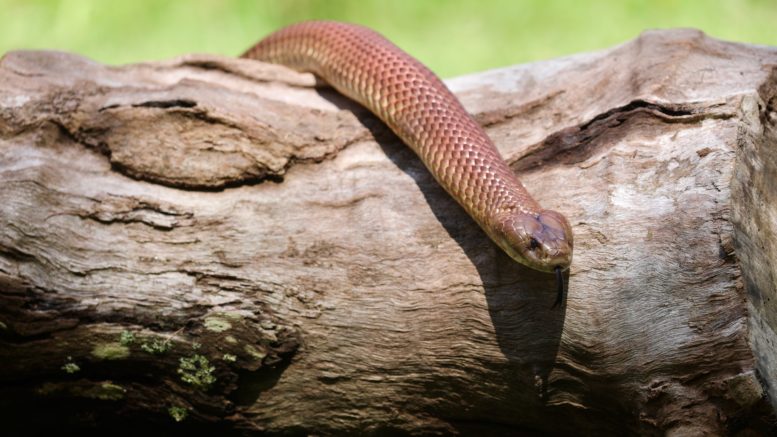The Australian Reptile Park has issued an urgent warning for residents to be on the lookout for venomous snakes with temperatures rising after recent rainfall – the perfect environment for snakes.
With the east coast of Australia currently experiencing one of the warmest winters on record, snake experts believe that snake season may begin earlier than expected.
As temperatures rise, snakes are emerging from their hiding spots earlier than usual, making it important for families to exercise caution.
Snake catchers have already reported a significant increase in callouts, a phenomenon rarely seen at this time of year.
Typically, snakes do not come out of brumation until September.
However, due to the unseasonably warm weather, experts warn that snakes could be active much earlier this year.
Park Operations Manager Billy Collett said snakes do not go out of their way to harm people.
“Snake bites mostly occur when people are trying to catch or kill the snake, so if you don’t do either of those things, there’s a greater chance that you’ll be okay,” he said.
“However, it is important to know snake bite first aid, so if the worst-case scenario occurs you are prepared.”
First aid for snake bites include keeping the bite victim calm and immobile, removing all jewellery/watches, applying a pressure-immobilisation bandage to the bite site, then bandaging the entire limb (not just the bite area) and seeking emergency medical assistance immediately by calling an ambulance or going directly to hospital.
“By applying the pressure-immobilisation bandage, venom cannot easily spread through the body, slowing down the envenomation process by buying the bite victim more time to seek medical attention at the hospital,” Collett said.
“Anyone who visits us here at the Park knows our staff spend as much time as possible educating people on snake safety.
“While the Australian Reptile Park saves approximately 300 lives each year through our antivenom program, experience tells us basic awareness and safety can also help save lives.”
With the warm Spring weather approaching, there’s a greater chance that snakes will find a safe haven in people’s backyards.

To assist in deterring snakes from backyards, the Australian Reptile Park advises residents to keep grass areas around their house mowed and well maintained; also avoid piling up left over firewood or accumulating stick piles.
Tin sheets or any household items like these that are piled up can draw in heat providing a perfect man-made habitat for snakes.
These areas provide a safe house for snakes as they sit in stealth mode awaiting prey to feed, and if startled they will defend through biting.
Depending on the species of venomous snake, a bite could destroy blood cells, cause blood clots, or excessive bleeding and destroy tissue.
If not correctly treated with first aid immediately, a fatality can occur in as little as 30 minutes, depending on the amount of venom injected by the snake, toxicity level of the venom and the type of snake.
The Australian Reptile Park is the only facility in the world that milks Australian terrestrial land snakes for the production of antivenom.
With 2,000 reported snake bites occurring annually in Australia, having rookies undergo rigorous training to contribute to the venom program becomes crucial, as it directly translates to saving an estimated 300 lives each year.
This is done with the help of CSL Seqirus, where the raw venom is transformed into the final product of lifesaving antivenom.
Source:
Australian Reptile Park


